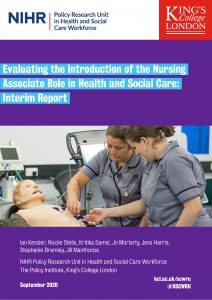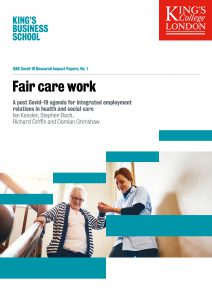
Interim Report
Ian Kessler is Professor of International HRM at King’s Business School and Deputy Director of the Policy Research Unit in Health and Social Care Workforce (HSCWRU). Prof Kessler is lead author of the Interim Report and two case studies from the HSCWRU Nursing Associates study, published today. (1,624 words)
Film of webinar (23/11/20) where Prof Kessler discussed these findings.
We are conducting a survey of senior health and social managers on the use and management of the nursing associate role. The survey is open until 18 December 2020.
The introduction of the Nursing Associate (NA) role in England represents a decisive step towards changing the structure of the nursing workforce, with a view to improving the quality of health and social care. Originally proposed by the 2015 Willis report on nurse and care assistant education[1], as ‘a bridging role’ between the care assistant and the registered nurse, the NA has emerged in NHS England as a pay band 4 role, requiring a two-year level 5 qualification, registered with and regulated by the Nursing and Midwifery Council (NMC). The NA programme was launched in early 2017 in two waves 11 pilot and 14 ‘fast follower’ sites, respectively taking-on 1,000 Trainee Nursing Associates (TNA). There were subsequent waves, with 5,000 TNAs recruited in 2018 and 7,500 in 2019. It is a role which attracts interest given its capacity to address a variety of workforce and care management goals. However, as with the introduction of any new role, there are organisational challenges to be faced in ensuring that it becomes established at the workplace level and accepted by the various actors with a stake in it, including nurses, managers, healthcare assistants and service users. Continue reading →
 Richard Griffin MBE is Visiting Senior Research Fellow, King’s Business School. (434 words)
Richard Griffin MBE is Visiting Senior Research Fellow, King’s Business School. (434 words)


 Dr. Nayyara Tabassum is Evidence Officer in the
Dr. Nayyara Tabassum is Evidence Officer in the 
